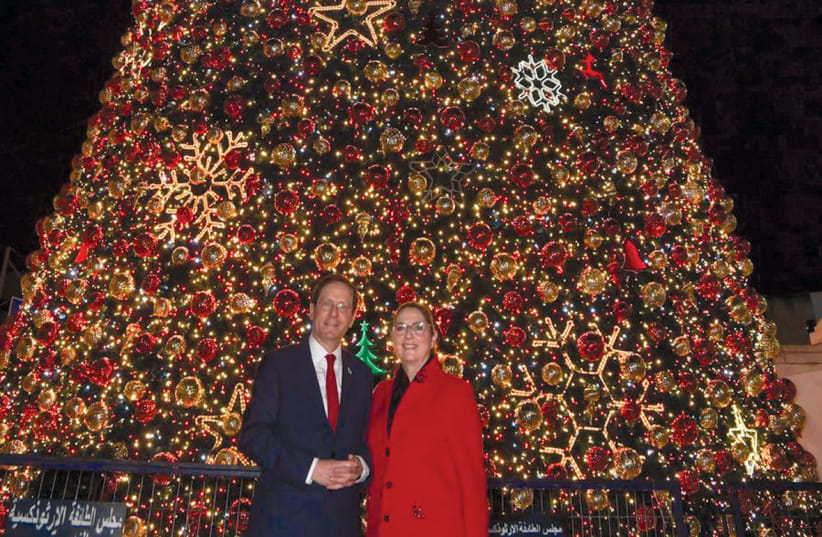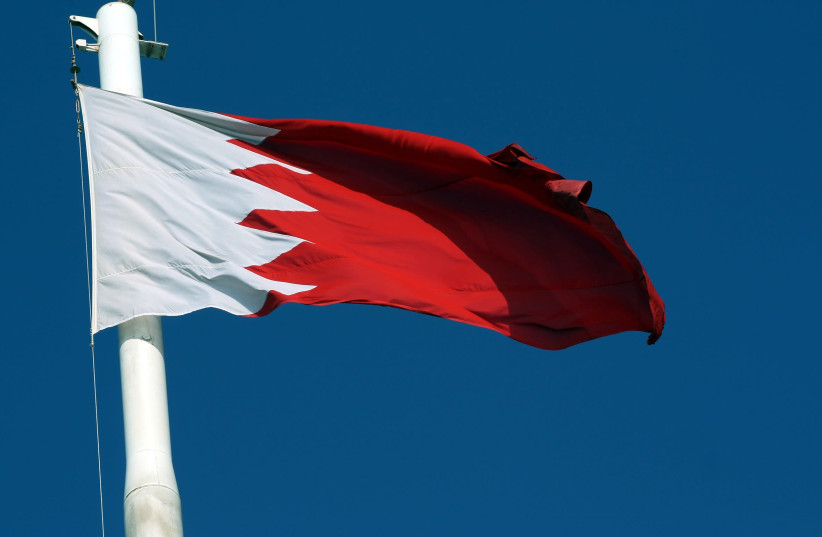In a first for Israel, the National Day of the modern state of Bahrain as an Arab and Muslim country was celebrated on Wednesday at the Tel Aviv Hilton where it was hosted by Ambassador Khaled Yusuf Al Jalahma and his wife Nouf.
It’s a given that Arabs are included on many diplomatic guest lists, and occasionally they come to events dressed in traditional garb, but usually, the only traditional item of clothing is the hijab– the head covering worn by Muslim women. But on Wednesday, it was a matter of both principle and pride for them to wear the abaya, the long, flowing garment which in western parlance is a caftan. There were some absolutely exquisite examples of superbly embroidered gowns, but none more spectacular than the jeweled gold abaya worn by the ambassador’s wife. The ambassador himself looked magnificent in the traditional gold-trimmed black and white ensemble that is mostly worn by Muslim dignitaries.
What was even more eye-catching was the transformation of the hotel’s King Solomon Hall, into a mini-museum. It wasn’t all that small a museum either, and it was beautifully curated to show antiquity, history, geography, crafts and modernity.
“We have a civilization that goes back 5,000 years, and we wanted people to know about the culture, the food, the beverages and to get a taste of Bahrain,” Al Jalahma told this writer.
The “museum” was a mine of information about Bahrain, and hopefully, the embassy will arrange for a traveling exhibition around Israel to make more people aware of one of Israel’s most recent peace partners.
The Kingdom of Bahrain was founded in 1783 by Ahmed Al-Fatah. When King Hamad Bin Isa Al Khalifa ascended the throne in 1999, the kingdom entered a new era of reforms through which it embarked on a program of comprehensive and sustainable development.
In his official remarks, Al Jalahma termed the holding of his country’s National Day reception in Israel “a remarkable achievement”.
Two years ago, it would have been considered unbelievable, he said, adding that just as Al Khalifa had changed the course of history in the Kingdom of Bahrain, he had envisaged a path to peace and prosperity and coexistence for everyone in the region. But he realized that Bahrain could not do it alone, which led to the establishment of the Abraham Accords.
Al Jalahma stated that he felt honored and privileged to have been asked by the king to serve as Bahrain’s first ambassador to the State of Israel.
He keeps hearing how difficult and challenging his mission is, he said, “but there is so much opportunity and hope for turning dreams into reality.”
The fact that he was in Israel heading an embassy was already a dream that became a reality, he said and urged others in the region to put differences aside and work for a better future for all.
A congratulatory letter that President Isaac Herzog had sent to the King of Bahrain was read out by Ambassador Zvi Aviner-Vapni, who is Herzog’s adviser on foreign affairs.
The government was represented by Oded Forer, minister for agriculture and rural development, who was so impressed by Al Jalahma’s speech, that he almost forgot to read his own. Over the past decade, he said, the Kingdom of Bahrain had reached remarkable achievements and become a role model of moderation. Since entering into diplomatic relations with Israel, 18 bilateral agreements had been signed and the momentum for more is strong, said Forer, who spoke of a joint agreement for agricultural innovation, which hopefully will relieve starvation in the region.
■ IT IS not customary for diplomats to exchange gifts, because gift giving in the diplomatic community could be very expensive, considering the number of countries that have diplomatic relations with other countries. There are, of course, exceptions to the rule, especially among countries that were once part of the Soviet Union. Even when the actual diplomats don’t exchange gifts, some of their guests at their various events somehow feel the need to bring a gift. Thus, there were a few gifts for Kazakhstan Ambassador Satybaldy Burshakov at the reception marking his country’s 30th anniversary of independence but what was particularly nice to see was Russian Ambassador Anatoly Viktorov enter the banquet room at the Dan Hotel in Tel Aviv with a huge bouquet of flowers, which he presented to Burshakov’s wife Maira Karakeshova.
What was not so nice was the attire of many of the guests who came casually dressed, which in a sense was a sign of disrespect for the nature and location of the event. All the male diplomats, however, wore business suits and ties.
Proof of the headway that Kazakhstan has made in Israel, was seen in the large turnout which exceeded that of previous years, necessitating a larger banquet hall in the hotel than had been the case in the past. Representing the government of Israel was Tourism Minister Yoel Razvozov, who as it happens, actually has a close relationship with Kazakhstan and recently visited there.
Burshakov paid tribute to former long-standing, post-Communist president of democratic Kazakhstan Nursultan Nazarbayev, whose vision and determination brought Kazakhstan to the strong position in which it stands today. Nazarbayev modernized the country and introduced large-scale reforms that affected all spheres of society. He pursued a policy of peace, stability and mutual understanding and established diplomatic relations with 186 countries.
Next year, Kazakhstan will host the Conference on Interaction and Confidence Building Measures in Asia (CICA) Summit. Earlier this year Razvozov participated in the 6th ministerial meeting of CICA during his visit to Kazakhstan.
Next year will also mark the 30th anniversary of the establishment of diplomatic relations between Israel and Kazakhstan. Burshakov noted that Israel was one of the first countries to enter into diplomatic relations with Kazakhstan after it gained independence and is also Kazakhstan’s key partner in the Middle East. He also thanked Israel for the health care and humanitarian assistance it provided to Kazakhstan during the COVID-19 pandemic.
Razvozov said that cooperation between the governments of the two countries is based on mutual efforts to promote innovation, coexistence and dialogue.
This year, MASHAV and KazAID, the international agencies for the development of the two countries, signed a memorandum of understanding that will enable the sharing of knowledge and experience with the focus on Central Asia.
Razvozov underscored the fact that Kazakhstan votes in favor of Israel in various international institutions, and shares a common history with its Jewish population. “During the Holocaust, the Kazakh leadership and people welcomed Jews fleeing from the Nazis, with open arms,” he said, adding that today, the Jewish community of Kazakhstan is a flourishing community with a rich heritage, culture and institutions, and is a significant contributor to the fruitful relations between the two countries.
■ IT’S RARE for the president of Israel to go to church, more so if he happens to be the grandson of the nation’s first Ashkenazi Chief Rabbi. But Isaac Herzog sees his role as president of all the citizens of Israel as something more than lip service. He has to respect the faiths of the different citizens, just as he expects them to respect the Jewish faith. It is expected that he visits leading rabbis and invites them to visit him. He has also been to the Arab villages of Taiba and Kafr Kassem whose populations are largely Muslim; and this week – with Christmas just around the corner – he decided to visit Nazareth, a city holy to Christians.
There were sparkling Christmas trees large and small all over the place, just as there are in Jaffa. One of the largest there is in the square by the clock tower, and many can also be seen in the show windows of stores and inside restaurants. But Jaffa does not have quite the same Christmas impact as Nazareth, which is a holy city to Christians of all denominations.
Herzog and his wife, Michal, visited Nazareth his week where together with church leaders and Nazareth Mayor Ali Salem, they were photographed in front of the Greek Orthodox Church’s Christmas tree. This tree is believed to be the largest in the Middle East. Speaking in Hebrew and Arabic, Herzog said: “We are committed to all the faiths of the Holy Land. May they prosper, and grow, and continue to strike roots, and feel safe, and feel part of the State of Israel – Muslims, Christians, Jews, Druze, and Circassians. All religious communities and faiths are an inseparable part of the State of Israel, and the State of Israel is committed to guaranteeing the freedom of faith and worship of all of them.”
Aware that Christmas is a season of peace, goodwill and joy, Herzog in his address spoke not only to the people of Nazareth or of Israel alone but to the wider world.
“I stand here as the President of the State of Israel and call on all our brothers and sisters of faith around the world, and especially in the Middle East – Christians, Muslims, Jews, Druze, and Circassians. May we always remember that we all pray to the same God and that we all want lives of peace and partnership based on understanding and fraternity,” he said. “Just before Christmas and the New Year, we bring good tidings from the Basilica of the Annunciation, from the Holy Land, to the whole world! Tidings of peace, tidings of fraternity, tidings of coexistence, tidings of a war against hatred and racism.”
Salem commended the Herzogs on what he considered to be their important visit to Nazareth, especially as it came just before Christmas, the holiday that symbolizes peace and love. “We have known each other for many years and I am sure that the President will continue to assist the whole Arab sector, just as he has done to date,” he said.
The president of Israel traditionally hosts an annual reception for religious and lay leaders of the various Christian denominations some time between the Latin Christmas and that of the Eastern Orthodox Churches, which means that the Herzogs will soon meet again with some of the people they met this week.
greerfc@gmail.com

